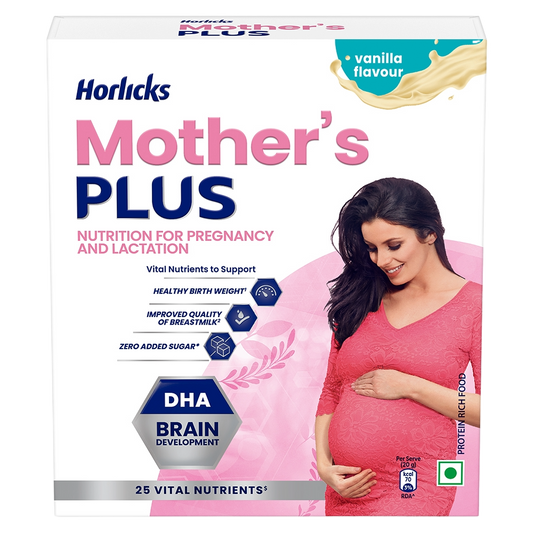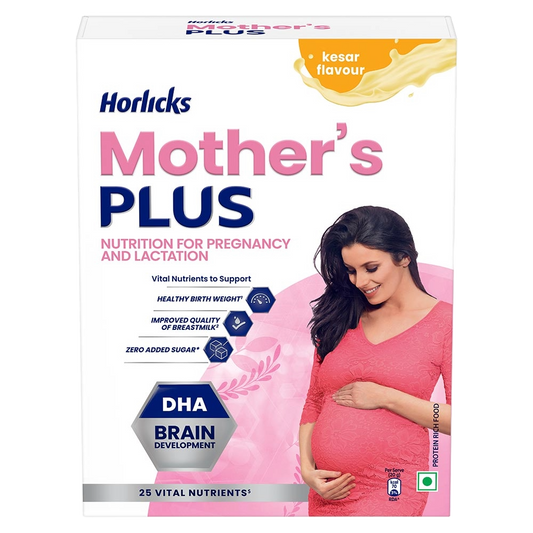After months of looking forward to meeting your little bundle of joy, words fall short of describing the feeling of holding your newborn baby in your arms. It is truly magical and right from that first cradle, there is an unbreakable bond of love and trust between you and your baby.
The most important thing postpartum is establishing a good latch so that you can breastfeed your baby. Once that is established, understanding the hunger cues and feeding the baby as frequently as required is unique to you and your baby1
Benefits Of Breastfeeding
Breastmilk provides perfectly balanced nutrition for your newborn. It supports the growth and development of your baby with a near-perfect mix of nutrients – vitamins, minerals, fat, and protein. It is easy to digest and helps your child in gaining the right amount of weight as they develop. Breastmilk helps babies in fighting infections and allergies by strengthening their immune system.
Based on the recommendation of your paediatrician, as well as your milk production, you can choose to either breastfeed your baby or opt for formula milk. Once your baby has been introduced to solid foods, you can continue to breastfeed them until the end of the first year, or for as long as you like (and are able to produce milk), until gradually weaning them off.
Nutrition And Lactation
Following a healthy diet, postpartum is as important as eating right during pregnancy. During the first six months, your baby is exclusively dependent on your breastmilk for meeting their nutrient requirements. Your diet ends up influencing the nutritional quality of your breastmilk. Additionally, certain food items are known to aid lactation and support the production of milk.
The role of nutrition in supplementing lactation can be confusing in a lot of ways. Should you be consuming extra calories? What foods should you eat, and which ones should you avoid? How does your diet affect the production of breastmilk?
These are a few of the many questions that new mothers struggle with. Let’s try and understand the basics of the role that nutrition plays in supplementing lactation.
- The need for extra calories2
While you breastfeed your baby, you will need to consume additional calories to provide you with the energy and nutrition to produce enough milk for your baby. The Indian postpartum diet of dry fruit and methi ladoos is a tried and tested method to supplement your calorific needs. You can also opt for other calorie-dense food items such as peanut butter, plain sugar-free yogurt, bananas, and apples.
Without sufficient protein in your diet, your breastmilk can lack casein, a protein that is vital for the growth and development of your baby. Continue eating the protein-rich food items that you did during your pregnancy. If you follow a non-vegetarian diet, include eggs, fish, meat, and poultry in your diet, and if you follow a vegetarian diet incorporate plant-based protein sources such as soy in your daily diet3
- Other requisite nutrients
Apart from protein and extra calories, make sure you include foods that are rich in iron and Vitamins C, B, and A, as these nutrients in your breastmilk vary with your diet. Include a variety of lentils, legumes, whole grains, green leafy vegetables, dried fruits, fresh fruits, and vegetables in various forms in your meals. A bowlful of curd with every meal will ensure that you meet your daily requirement of calcium.
An excellent way to complement your daily balanced diet is by incorporating a nutritional drink such as Horlicks Mother’s Plus in your routine. It has been scientifically designed with the nutritional requirements of pregnant and lactating women in mind. Horlicks Mother’s Plus has 25 nutrients including 21 essential vitamins and minerals in addition to carbohydrates, protein, fat and DHA* that are important to provide optimal nutrition for the mother’s health and baby’s growth.
The choline and DHA present in Horlicks Mother’s Plus, are vital for the normal development of the brain and nervous system of the baby both pre and postpartum. Additionally, it contains Vitamins B1, B2, B6, B12, A, Selenium, and iodine, which are known to help improve the quality of breastmilk and supplement lactation. Available in Vanilla and Kesar variants, Horlicks Mother's Plus is the number 1 gynaecologist recommended nutritional drink for pregnant women^.
Make it a habit to drink a glass of water every time you feed your baby. However, avoid juices and sugary drinks such as cola and other carbonated drinks as much as you can.
A few foods and beverages that you should consider limiting or avoiding altogether while you are lactating are:
No level of alcohol in the Breastmilk is safe for your baby. Avoid consumption of alcohol at least 4 to 5 hours before feeding your baby. If you are going to have an alcoholic beverage, pump an adequate quantity of breastmilk to feed your baby later on.
Caffeine from your coffee or tea can disturb your baby’s sleep patterns, cause agitation and also interfere with your baby’s digestion. It is best to limit your consumption of coffee or choose decaffeinated coffee over regular coffee while you are lactating.
Besides eating right and making mindful choices, it is also important to closely monitor the effect of the kind of food you consume on your baby’s health. Some food items or drinks in your diet might cause an allergic reaction in your baby. Keep an eye out for rashes or stomach pains and avoid the suspected food for a week or two to see if anything changes.
Most importantly, don’t get too caught up in worrying about your diet and breastmilk production. Remember to make conscious and mindful dietary choices, and you are good to go!
Try to create a cosy little breastfeeding corner in your home, a little nook that helps you relax and stay calm while the little one suckles away. Breastfeeding your baby gives you a lot of one-on-one time to bond with them. It is your little bubble with just you and your precious little one in it – it is these little moments that you will cherish for life.









